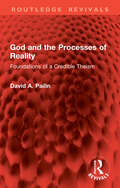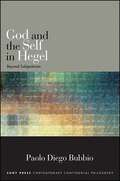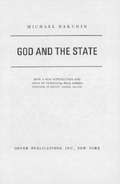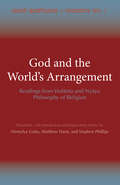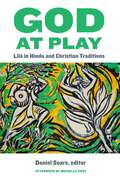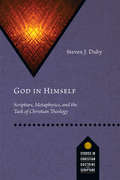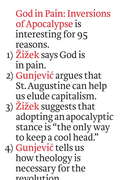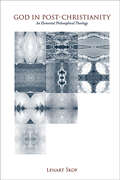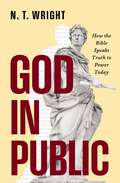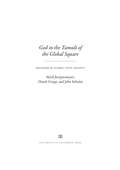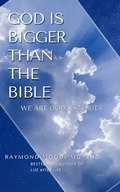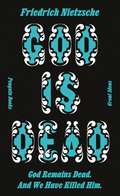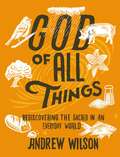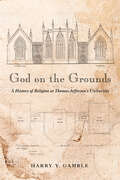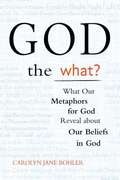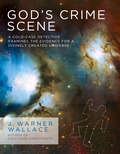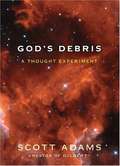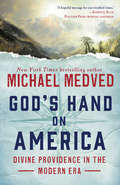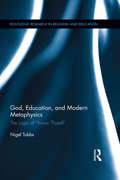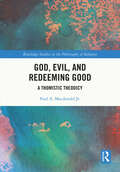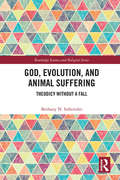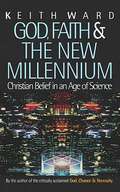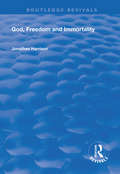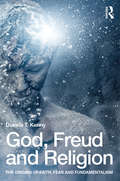- Table View
- List View
God and the Processes of Reality: Foundations of a Credible Theism (Routledge Revivals)
by David A. PailinCan belief in God be rational? David A. Pailin identifies the reasons behind this questioning of theistic faith in his book God and the Processes of Reality (originally published in 1989) and demonstrates how the supposed incoherences in the concept of God are due to the generalization of partial insights. He establishes the basic character of the concept of God, and examines the nature of the major attributes of the divine and of the relationship of God to the processes of reality, looking at God as creator, the relation of God to historical events, and the role of God as the basis for individual fulfilment.The book takes up many of the insights developed by Whitehead and Hartshorne in what is commonly known as process thought. Pailin explains these insights and counters common misapprehensions about them critically, sometimes radically so, to present a credible understanding of the God of theistic belief and a coherent understanding of the relationship of that God to the processes of reality. This book will be of interest to students and researchers of religion and philosophy.
God and the Self in Hegel: Beyond Subjectivism (SUNY series in Contemporary Continental Philosophy)
by Paolo Diego BubbioGod and the Self in Hegel proposes a reconstruction of Hegel's conception of God and analyzes the significance of this reading for Hegel's idealistic metaphysics. Paolo Diego Bubbio argues that in Hegel's view, subjectivism—the tenet that there is no underlying "true" reality that exists independently of the activity of the cognitive agent—can be avoided, and content can be restored to religion, only to the extent that God is understood in God's relation to human beings, and human beings are understood in their relation to God. Focusing on traditional problems in theology and the philosophy of religion, such as the ontological argument for the existence of God, the Trinity, and the "death of God," Bubbio shows the relevance of Hegel's view of religion and God for his broader philosophical strategy. In this account, as a response to the fundamental Kantian challenge of how to conceive the mind-world relation without setting mind over and against the world, Hegel has found a way of overcoming subjectivism in both philosophy and religion.
God and the State (Select Bibliographies Reprint Ser.)
by Michael BakuninA founder of modern philosophical anarchism presents a clear introduction to anarchist thought and a manifesto of atheism. Bakunin offers a mind-opening experience for even the most skeptical readers. This influential work denounces religion as a weapon of the state that must be smashed in the pursuit of the right to self-determination.
God and the World's Arrangement: Readings from Vedanta and Nyaya Philosophy of Religion
by Stephen Phillips Matthew Dasti Nirmalya GuhaThe work of three present-day Sankritist-philosophers, God and the World's Arrangement allows readers to engage directly with writings of the classical Indian philosophers Śaṅkara and Vācaspati, as well as some of their most acute critics, on the question of whether the existence of a creator God can be known by reason alone. Carefully selected and annotated with the needs of students foremost in mind, these new translations will be of interest to anyone wishing to see up close a newly set gem of our philosophical inheritance from global antiquity.
God at Play: Līlā in Hindu and Christian Traditions (Comparative Theology: Thinking Across Traditions)
by Daniel SoarsThe first comparative treatment of the topic of līlā in Hindu and Christian traditions, this volume explores what it means to consider divine and human action under the categories of play, wit, drama, grace, and compassionGod at Play presents a theological exploration of the multifaceted motif of līlā across diverse Hindu and Christian landscapes and its wide-ranging connections to divine and human creativity. Given its ubiquity in Hindu theologies and life-forms, līlā offers a rich comparative framework for exploring certain ways of understanding divine and human action as expressed in Hindu and Christian sacred texts, philosophical theology, and ritual practices.Though līlā is often interpreted simply as “play,” the essays in this volume reflect a far richer semantic and conceptual field, ranging from spontaneity and gratuitousness, through joy and humor, to mercy and compassion. By focusing on the different contexts in which līlā is found in Hindu traditions and resisting any uniform translation of the term, the contributors to this volume avoid the risk of using predominantly western or Christian categories to understand the Hindu other. The volume thus explores how līlā functions in a variety of distinctive philosophical, theological, and devotional ways across Hindu traditions, and listens for echoes in Christian understandings of the gratuitousness of the created order in relation to God.God at Play is a genuine experiment in deep learning across traditions. Each chapter reflects on what is learned by taking līlā as the category of comparison and invites the reader to think about what these conversations add, confirm, or change in relation to earlier twentieth-century scholarship on play—not least, in terms of what difference it might make to understand human life as an imitation and a participation in the divine life of a playful deity.
God in Himself: Scripture, Metaphysics, and the Task of Christian Theology (Studies in Christian Doctrine and Scripture)
by Steven J. DubyHow do we know God? Can we know God as he is in himself?
God in Pain
by Slavoj Zizek Ellen Elias-Bursac Boris GunjevicA brilliant dissection and reconstruction of the three major faith-based systems of belief in the world today, from one of the world's most articulate intellectuals, Slavoj Zizek, in conversation with Croatian philosopher Boris Gunjévic. In six chapters that describe Christianity, Islam, and Judaism in fresh ways using the tools of Hegelian and Lacanian analysis, God in Pain: Inversions of Apocalypse shows how each faith understands humanity and divinity--and how the differences between the faiths may be far stranger than they may at first seem. Chapters include (by Zizek) (1) "Christianity Against Sacred," (2) "Glance into the Archives of Islam," (3) "Only Suffering God Can Save Us," (4) "Animal Gaze," (5) "For the Theologico-Political Suspension of the Ethical," (by Gunjevic) (1) "Mistagogy of Revolution," (2) "Virtues of Empire," (3) "Every Book Is Like Fortress," (4) "Radical Orthodoxy," (5) "Prayer and Wake."
God in Post-Christianity: An Elemental Philosophical Theology (SUNY series in Theology and Continental Thought)
by Lenart ŠkofGod in Post-Christianity combines Eastern and Western influences into a dazzling survey of the contemporary theological landscape. Reading "the age of the Spirit" as "the age of the Breath," the book argues for a material, elemental, and sensory theology of God following the death of the ontotheological God of metaphysics. Drawing inspiration equally from Irigaray and Feuerbach, it offers a vision of God that is both feminist and humanist, a divine becoming for humanity, a sacred alliance with Nature. By presenting and analyzing the modern philosophies of Hegel, Schelling, and Merleau-Ponty, as well as such contemporary figures as John Caputo and Catherine Keller, and by drawing on unexpected, forgotten, or neglected sources such as Vedic poetry and American Mormonism and figures such as Averroes and Amalric of Bène, the book makes an original argument about God that resonates with currents in new materialism, comparative theology, and affect theory. Both speculative and mythopoetic, it is intended to forge a way forward for humanity to achieve the intersubjective and interreligious peace we all crave and deserve.
God in Public: How the Bible Speaks Truth to Power Today
by N. T. WrightDrawing on a collection of lectures that N. T. Wright delivered from 1999 to 2015, God in Public brings together the message of Jesus--in its larger biblical context--and the challenges of the contemporary public and political worlds.In this book, Wright challenges the West's response to 9/11 and then expands to discuss a more Jesus-inspired way of approaching the public problems we find ourselves in, based on following Jesus' life and teachings.As Wright demonstrates the many ways in which faithful exegesis of scripture can throw fresh light--God's light--on the great philosophical and ethical problems of our day, he discusses urgent questions such as: What has Christianity to do with power?Why must the church remind those in authority of their responsibilities?What can Christians do to act as the voice of the voiceless?
God in the Tumult of the Global Square: Religion in Global Civil Society
by Mark Juergensmeyer Dinah Griego John SoboslaiHow is religion changing in the twenty-first century? In the global era, religion has leapt onto the world stage, though often in contradictory ways. Some religious activists are antagonistic and engage in protests, violent acts, and political challenges. Others are positive and help to shape an emerging transnational civil society. A new global religion may be in the making, providing a moral and spiritual basis for a worldwide community of concern about environmental issues, human rights, and international peace. God in the Tumult of the Global Square explores all of these directions, based on a five-year Luce Foundation project that involved religious leaders, scholars, and public figures in workshops held in Cairo, Moscow, Delhi, Shanghai, Buenos Aires, and Santa Barbara. In this book, the voices of these religious observers around the world express both the hopes and fears about new forms of religion in the global age.
God is Bigger Than the Bible: We Are God's Stories
by Raymond MoodyDr. Raymond Moody looks at God and how his personal understanding of the Creator has changed over the course of his life and research into near-death experiences. Dr. Moody organizes his insights about God into 13 simple and profound ideas and walks us through them using stories and examples from his own life and from accounts of encounters with God in the hereafter. He looks at our society's beliefs about God, how religion can both help and hinder our relationships with the Divine, and how we can bring Source into our lives with a new understanding that transcends all limits.
God is Dead. God Remains Dead. And We Have Killed Him. (Penguin Great Ideas)
by Friedrich Nietzsche'We have left dry land and put out to sea! We have burned the bridge behind us - what is more, we have burned the land behind us!'Nietzsche's devastating demolition of religion would have seismic consequences for future generations. With God dead, he envisages a brilliant future for humanity: one in which individuals would at last be responsible for their destinies.One of twenty new books in the bestselling Penguin Great Ideas series. This new selection showcases a diverse list of thinkers who have helped shape our world today, from anarchists to stoics, feminists to prophets, satirists to Zen Buddhists.
God of All Things: Rediscovering the Sacred in an Everyday World
by Andrew WilsonAbstract theology is overrated, for God can be found in even the most ordinary of things. Jesus used things like a lily, sparrow, and sheep to teach about the kingdom of God. And in the Old Testament, God repeatedly describes himself and his saving work in relation to physical things such as a rock, horn, or eagle.In God of All Things, pastor and author Andrew Wilson invites you to rediscover God in this way, too--through ordinary, everyday things. He explores the idea of a material world and presents a variety of created marvels that reveal the gospel in everyday life and fuel worship and joy in God--marvels like:Dust: the image of GodHorns: the salvation of GodDonkeys: the peace of GodWater: the life of GodViruses: the problem of GodCities: the kingdom of GodGod of All Things will leave you with a deeper understanding of Scripture, the world you live in, and the God who made it all.
God of Many Names: Play, Poetry and Power in Hellenic Thought, From Homer to Aristotle
by Mihai I. SpariosuTracing the interrelationship among play, poetic imitation, and power to the Hellenic world, Mihai I. Spariosu provides a revisionist model of cultural change in Greek antiquity. Challenging the traditional and static distinction made between archaic and later Greek culture, Spariosu's perspective is grounded in a dialectical understanding of values whose dominance depends on cultural emphasis and which shifts through time.Building upon the scholarship of an earlier volume, Dionysus Reborn, Spariosu her continues to draw on Dionysus--the "God of many names," of both poetic play and sacred power--as a mythical embodiment of the two sides of the classical Greek mentality. Combining philosophical reflection with close textual analysis, the author examines the divided nature of the Hellenic mentality in such primary canonic texts as the Iliad, the Odyssey, the Theogony, Works and Days, the most well-known of the Presocratic fragments, Euripides' Bacchae, Aristophanes' The Frogs, Plato's Republic and Laws, and Aristotle's Poetics and Politics.Spariosu's model illuminates the many of the most enduring questions in contemporary humanistic study and addresses modern questions about the nature of the interrelation of poetry, ethics, and politics.
God on the Grounds: A History of Religion at Thomas Jefferson's University
by Harry Y. GambleFree-thinking Thomas Jefferson established the University of Virginia as a secular institution and stipulated that the University should not provide any instruction in religion. Yet over the course of the nineteenth century and into the early twentieth, religion came to have a prominent place in the University, which today maintains the largest department of religious studies of any public university in America. Given his intentions, how did Jefferson's university undergo such remarkable transformations?In God on the Grounds, esteemed religious studies scholar Harry Gamble offers the first history of religion’s remarkably large role—both in practice and in study—at UVA. Jefferson’s own reputation as a religious skeptic and infidel was a heavy liability to the University, which was widely regarded as injurious to the faith and morals of its students. Consequently, the faculty and Board of Visitors were eager throughout the nineteenth century to make the University more religious. Gamble narrates the early, rapid, and ongoing introduction of religion into the University’s life through the piety of professors, the creation of the chaplaincy, the growth of the YMCA, the multiplication of religious services and meetings, the building of a chapel, and the establishment of a Bible lectureship and a School of Biblical History and Literature. He then looks at how—only in the mid-twentieth century—the University began to retreat from its religious entanglements and reclaim its secular character as a public institution. A vital contribution to the institutional history of UVA, God on the Grounds sheds light on the history of higher education in the United States, American religious history, and the development of religious studies as an academic discipline.
God the What?: What Our Metaphors for God Reveal about Our Beliefs in God
by Carolyn Jane Bohler<p>"We do not have to let go of one sense of God to take up another. Neither do we need to go about challenging old metaphors. What is crucial is to find a metaphor--or two, or six--that creatively point toward what we believe." --from Chapter 1 <p>Let Carolyn Jane Bohler inspire you to consider a wide range of images of God in order to refine how you imagine God to have and use power, and how God wills and makes divine will happen--or not. By tapping into your God-given ability to re-imagine God, you will have a better understanding of your own beliefs and how you, God and the world relate to each other. <p>Wonderfully fresh and down to earth, Bohler uses playful images, moving stories and solid scholarship to empower you to break free of old habits and assumptions, whatever your faith tradition. She encourages you to explore new names for God that are not only more consistent with what you believe, but will also deepen and expand your experience of God. Think about ... <p> <li>God the Choreographer of Chaos <li>God the Nursing Mother <li>God the Jazz Band Leader <li>God the Divine Blacksmith <li>God the Divine Physical Therapist <li>God the Team Transformer <li>... and more</li> </p>
God's Crime Scene: A Cold-Case Detective Examines the Evidence for a Divinely Created Universe
by J. Warner WallaceThere are four ways to die, and only one of them requires an intruder. Suicides, accidental, and natural deaths can occur without any evidence from outside the room. But murders typically involve suspects external to the crime scene. If there's evidence of an outside intruder, homicide detectives have to prepare for a chase. Intruders turn death scenes into crime scenes. Join J. Warner Wallace, former atheist, seasoned cold-case detective, and popular national speaker as he tackles his most important case ... with you on the jury! With the expertise of a cold-case detective, J. Warner examines eight critical pieces of evidence in the "crime scene" of the universe to determine if they point to a Divine Intruder. If you have ever wondered if something (or someone) outside the natural realm created the universe and everything in it, this is the case for you.
God's Debris: A Thought Experiment
by Scott Adams"God's Debris" is a set of provocative questions (thought experiments) about God and science, wrapped in a fictional story. It is designed to inspire readers to question their views of reality.
God's Hand on America: Divine Providence in the Modern Era
by Michael MedvedThe national radio host and bestselling author of The American Miracle reveals the happy accidents, bizarre coincidences, and flat-out miracles that continue to shape America&’s destiny. &“A hopeful message for our troubled times . . . Michael Medved has an eye for a story, and a preternatural gift for telling it in beguiling ways.&”—Joseph J. Ellis, Pulitzer Prize and National Book Award–winning author of Founding Brothers Has God withdrawn his special blessing from the United States? Americans ponder that painful question in troubled times, as we did during the devastation of the Civil War and after the assassinations of the &’60s, and as we do in our present polarization. Yet somehow—on battlefields, across western wilderness, and in raucous convention halls—astounding events have reliably advanced America, restoring faith in the Republic&’s providential protection. In this provocative historical narrative, Michael Medved brings to life ten haunting tales that reveal this purposeful pattern, including: • A near-fatal carriage accident forces Lincoln&’s secretary of state into a canvas-and-steel neck brace that protects him from a would-be assassin&’s knife thrusts, allowing him two years later to acquire Alaska for the United States. • A sudden tidal wave of Russian Jewish immigration, beginning in 1881, coincides with America&’s rise to world leadership, fulfilling a biblical promise that those blessing Abraham&’s children will themselves be blessed. • Campaigning for president, Theodore Roosevelt takes a bullet in the chest, but a folded speech in his jacket pocket slows its progress and saves his life. • At the Battle of Midway, U.S. planes get lost over empty ocean and then miraculously reconnect for five minutes of dive-bombing that wrecks Japan&’s fleet, convincing even enemy commanders that higher powers intervened against them. • A behind-the-scenes &“conspiracy of the pure of heart&” by Democratic leaders forces a gravely ill FDR to replace his sitting vice president—an unstable Stalinist—with future White House great Harry Truman. These and other little-known stories build on themes of The American Miracle, Medved&’s bestseller about America&’s remarkable rise. The confident heroes and stubborn misfits in these pages shared a common faith in a master plan, which continues to unfold in our time. God&’s Hand on America confirms that the founders were right about America&’s destiny to lead and enlighten the world.
God, Education, and Modern Metaphysics: The Logic of "Know Thyself" (Routledge Research in Religion and Education)
by Nigel TubbsThe Western tradition has long held the view that while it is possible to know that God exists, it nevertheless remains impossible to know what God is. The ineffability of the monotheistic God extends to each of the Abrahamic faiths. In this volume, Tubbs considers Aristotle’s logic of mastery and questions the assumptions upon which God’s ineffability rests. Part I explores the tensions between the philosophical definition of the One as "thought thinking itself" (the Aristotelian concept of noesis noeseos) and the educational vocation of the individual as "know thyself" (gnothi seuton). Identifying vulnerabilities in the logic of mastery, Tubbs puts forth an original logic of education, which he calls modern metaphysics, or a logic of learning and education. Part II explores this new educational logic of the divine as a "logic of tears," as a "dreadful religious teacher," and as a way to cohere the three Abrahamic faiths in an educational concept of monotheism.
God, Evil, and Redeeming Good: A Thomistic Theodicy (Routledge Studies in the Philosophy of Religion)
by Paul A. Macdonald Jr.This book offers an original contribution to debates about the problem of evil and the existence of God. It develops a Thomistic, Christian theodicy, the aim of which is to help us better understand not only why God allows evil, but also how God works to redeem it. In the author’s view, the existence of evil does not generate any intellectual problem that theists must address or solve to vindicate God or the rationality of theism. This is because acknowledging the existence of evil rationally leads us to acknowledge the existence of God. However, understanding how these two facts are compatible still requires addressing weighty, wide-ranging questions concerning God and evil. The author draws on diverse elements of Aquinas’s philosophy and theology to build an argument that evil only exists within God’s world because God has created and continues to sustain so much good. Moreover, God can and does bring good out of all evil, both cosmically and within the context of our own, individual lives. In making this argument, the author engages with contemporary work on the problem of evil from analytic philosophy of religion and theology. Additionally, he addresses a broad range of topics and doctrines within Thomistic and Christian thought, including God, creation, providence, original sin, redemption, heaven and hell, and the theological virtues. God, Evil, and Redeeming Good is an essential resource for scholars and students interested in philosophy of religion, philosophical theology, and the thought of Thomas Aquinas.
God, Evolution, and Animal Suffering: Theodicy without a Fall (Routledge Science and Religion Series)
by Bethany N. SollerederAfter the publication of On the Origin of Species in 1859, theologians were faced with the dilemma of God creating through evolution. Suddenly, pain, suffering, untimely death and extinction appeared to be the very tools of creation, and not a result of the sin of humanity. Despite this paradigm shift, the question of non-human suffering has been largely overlooked within theodicy debates, overwhelmed by the extreme human suffering of the twentieth century. This book redresses this imbalance by offering a rigorous academic treatment of the questions surrounding God and the suffering of non-human animals. Combining theological, philosophical, and biblical perspectives, this book explores the relationship between God and Creation within Christian theology. First it dismantles the popular theological view that roots violence and suffering in the animal kingdom in the fall of humanity. Then, through an exploration of the nature of love, it affirms that there are multiple reasons to suggest that God and creation can both be "good", even with the presence of violence and suffering. This is an innovative exploration of an under-examined subject that encompasses issues of theology, science, morality and human-animal interactions. As such, it will be of keen interest to scholars and academics of religion and science, the philosophy of religion, theodicy, and biblical studies.
God, Faith and the New Millennium: Christian Belief in an Age of Science
by Keith WardKeith Ward offers a new interpretation of Christianity, presenting a faith in harmony with the scientific worldview, while remaining true to its traditions.
God, Freedom and Immortality (Routledge Revivals)
by Jonathan HarrisonPublished in 1999, this text offers a comprehensive treatment of the Philosophy of Religion. Its overall conclusions are that, though there is no reason to suppose there is a God, doing something that is not quite believing in god, who, as some mystics think - neither exists nor does not exist, may be valuable for some people.
God, Freud and Religion: The origins of faith, fear and fundamentalism
by Dianna T. KennyChoice Essential Read Did God create man or did man create God? In this book, Dianna Kenny examines religious belief through a variety of perspectives – psychoanalytic, cognitive, neuropsychological, sociological, historical and psychiatric – to provide a coherent account of why people might believe in God. She argues that psychoanalytic theory provides a fertile and creative approach to the study of religion that attempts to integrate religious belief with our innate human nature and developmental histories that have unfolded in the context of our socialization and cultural experiences. Freud argued that religion is so compelling because it solves the problems of our existence. It explains the origin of the universe, offers solace and protection from evil, and provides a blueprint about how we should live our lives, with just rewards for the righteous and due punishments for sinners and transgressors. Science, on the other hand, offers no such explanations about the universe or the meaning of our lives and no comfort for the unanswered longings of the human race. Is religion a form of wish-fulfilment, a collective delusion to which we cling as we try to fathom our place and purpose in the drama of cosmology? Can there be morality without faith? Are science and religion radically incompatible? What are the roots of fundamentalism and terror theology? These are some of the questions addressed in God, Freud and Religion, a book that will be of interest to psychoanalysts, psychologists and psychotherapists, students of psychology, psychoanalysis, philosophy and theology and all those with an interest in religion and human behaviour. Dianna Kenny is Professor of Psychology at the University of Sydney, Australia. She is the author of over 200 publications, including six books.
